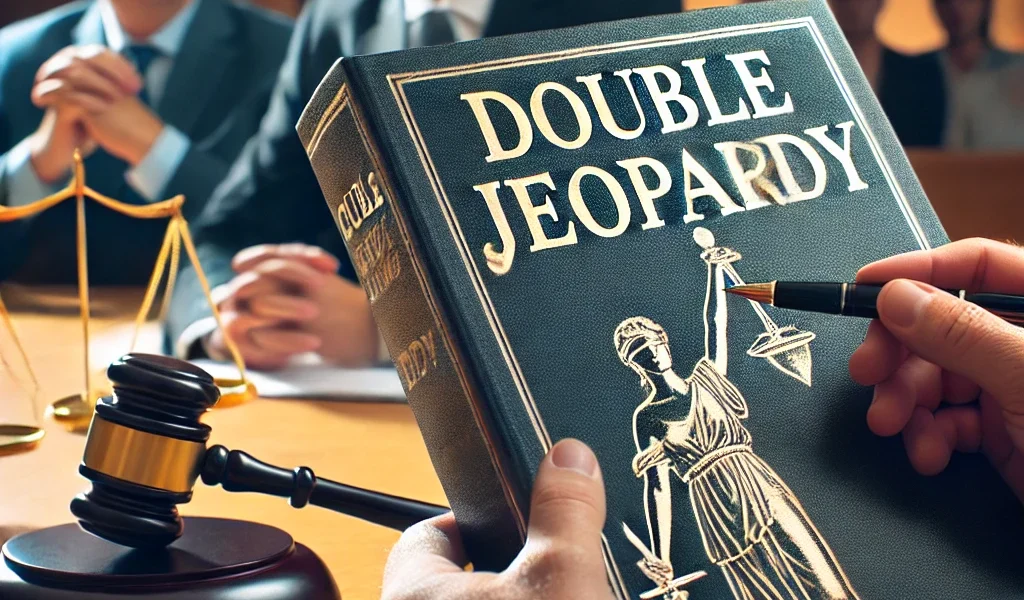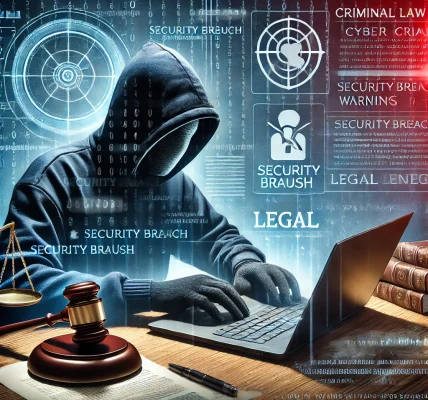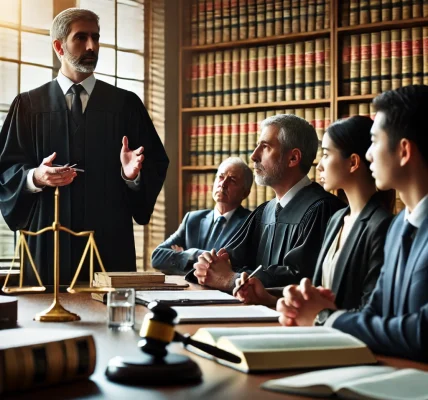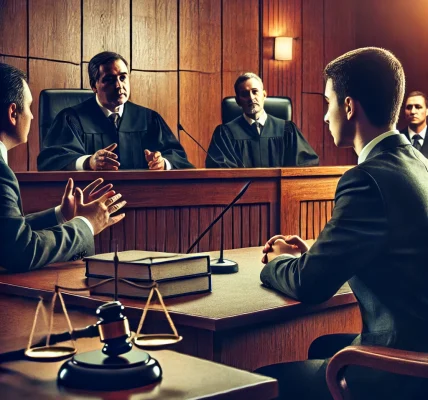Introduction
The concept of Double Jeopardy is a fundamental legal protection that prevents individuals from being tried twice for the same crime. This principle is embedded in various legal systems worldwide and serves as a safeguard against government abuse. Understanding the Double Jeopardy Clause, its legal implications, and exceptions can help individuals navigate the justice system with confidence.
In this blog, we will discuss what Double Jeopardy is, its significance in criminal law, key legal protections, notable case studies, and circumstances where exceptions apply.
1. What is Double Jeopardy?
Definition of Double Jeopardy
Double Jeopardy is a legal principle that prohibits an individual from being prosecuted twice for the same offense after an acquittal or conviction. This protection ensures fairness in the justice system by preventing repetitive trials, wrongful punishments, and government oppression.
Legal Basis of Double Jeopardy
The Fifth Amendment of the U.S. Constitution explicitly states:
“No person shall… be subject for the same offense to be twice put in jeopardy of life or limb.”
This clause establishes protection against:
- Retrial after acquittal
- Retrial after conviction
- Multiple punishments for the same offense
- Prosecution after certain mistrials
Most countries, including the UK, Canada, Australia, and India, also recognize Double Jeopardy in their legal frameworks.
2. Legal Protections Against Being Tried Twice
a) Protection from Retrial After Acquittal
If a defendant is acquitted (found not guilty) in a trial, the prosecution cannot appeal or retry the case with the same charges.
- Example: If a person is found not guilty of theft, the government cannot reopen the same case with new evidence.
b) Protection from Retrial After Conviction
Once convicted and sentenced, a person cannot be retried for the same crime.
- Example: If a person is convicted of assault and serves their sentence, they cannot be prosecuted again for the same act.
c) Protection from Multiple Punishments
A person cannot receive multiple punishments for the same offense.
- Example: If someone is sentenced to five years in prison, the court cannot later extend the sentence for the same offense.
d) Protection After Mistrial in Certain Cases
A mistrial occurs when a trial is invalidated due to procedural errors or a hung jury. In some cases, a retrial is possible, but not if the mistrial was caused by government misconduct.
3. Exceptions to Double Jeopardy Protections
While Double Jeopardy offers significant legal protections, certain exceptions exist where a retrial is allowed.
a) Separate Sovereigns Doctrine
Under the Separate Sovereigns Doctrine, different jurisdictions (state and federal) can prosecute a person for the same act.
- Example: A person acquitted of a crime in state court can still face charges in federal court if the crime violates both state and federal laws (e.g., drug trafficking or civil rights violations).
b) Civil vs. Criminal Cases
Double Jeopardy applies only to criminal cases, not civil lawsuits.
- Example: If a person is acquitted in a criminal murder trial, they can still be sued for wrongful death in a civil court (e.g., O.J. Simpson case).
c) Appeals by the Defendant
If a defendant appeals their conviction and wins a new trial, Double Jeopardy does not apply, as the second trial is initiated by the defendant.
- Example: If a person convicted of fraud successfully appeals, the prosecution can retry the case.
d) Reopening Cases Based on New Evidence (Limited)
Some legal systems allow retrials in serious cases if new evidence emerges, especially in cases of wrongful acquittals.
- Example: If DNA evidence proves a previously acquitted person committed a violent crime, some jurisdictions allow a retrial.
4. Landmark Cases in Double Jeopardy Law
a) United States v. Dixon (1993)
This case ruled that a person cannot be tried twice for the same offense under different charges (e.g., being charged for both “criminal contempt” and “drug possession” based on the same act).
b) Blockburger v. United States (1932)
This case established the “same elements test”, which helps courts determine if two offenses are distinct or the same.
c) O.J. Simpson Case (1995 & 1997)
O.J. Simpson was acquitted of murder charges in a criminal trial but was later found liable in a civil wrongful death lawsuit. This illustrates the difference between criminal and civil cases in Double Jeopardy law.
d) Heath v. Alabama (1985)
This case reaffirmed the Separate Sovereigns Doctrine, ruling that a person can be prosecuted in multiple states for the same crime.
5. How to Protect Yourself from Legal Pitfalls
If you are involved in a legal case, it’s crucial to understand your rights under Double Jeopardy and take precautions to ensure fair treatment.
a) Know Your Legal Rights
- If you are acquitted, ensure the prosecution cannot reopen the case.
- Understand that civil lawsuits may still be possible after criminal trials.
- Be aware of state and federal jurisdiction differences.
b) Seek Legal Counsel
- Always consult a criminal defense attorney if facing charges.
- If you are re-indicted for the same crime, an attorney can challenge the legality.
c) Avoid Self-Incrimination
- Do not make statements that could be used against you in multiple trials.
- If facing an appeal or retrial, exercise your right to remain silent until consulting a lawyer.
d) Stay Informed on Legal Changes
- Some legal systems are evolving to allow retrials in specific cases (e.g., wrongful acquittals based on new DNA evidence).
- Be aware of your jurisdiction’s laws regarding Double Jeopardy exceptions.
Conclusion
Double Jeopardy is a vital legal protection that prevents individuals from being tried twice for the same crime, ensuring fairness in the justice system. While it provides strong safeguards, there are exceptions, including the Separate Sovereigns Doctrine, civil lawsuits, and defendant-initiated appeals.
Understanding when Double Jeopardy applies, its legal exceptions, and how to protect yourself is crucial if you are involved in legal proceedings. If you ever face a legal situation involving retrials, consulting an experienced criminal defense attorney can help safeguard your rights.




